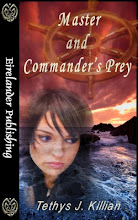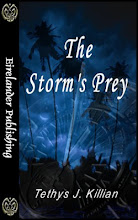We should've told you that there is one big difference between writing and television - the means is not at all the same.
How so? Television is a visual and audio means, while writing, and ultimately reading, engages all the senses and the imagination as well.
Consequently, television is a passive means, while reading, while not active in the real sense of the word, makes use of all your neurons to grasp the 'picture' in your mind.
This creates a different slant when penning characters in a novel. As most readers who would engage with a heroine are women, these women will need to feel a kinship with your heroine, literally become the heroine in their mind.
Just imagine a woman entering a very male-dominated bar. How would this be shown in on TV, and in a book?
TV would literally 'show' you the setting. You'll see the smoke hanging in the air; you'll hear the 'tac-pac' sound of billiard balls being hit; you'll also hear the ribald laughter and see the men throwing their heads back to chortle or to guzzle down a pitcher of beer.
Now you're in a book, and you need to convey this scene. How will you do it? Of course, you can say smoke hung in the air like a stale and oppressing canopy, making it hard to breathe without the toxic fumes scorching your trachea. You'll hear the sudden and disturbing clang of the billiard balls, the sound sending an explosion in your eardrums and the reverberations echoing all the way down to your empty stomach. The laughter of the men as they grope the waitresses and holler sends a shiver down your spine, revulsion making goosebumps rise on your forearms while all the hairs on your body stand on end. What on earth are you doing here? You'll notice the condensation running down the pitchers of beer, reminding you that you walked all the way from the farm to here, the other side of town, and suddenly you realize there's a fire burning your throat and your mouth feels like cotton because you're in desperate need of some thirst-quenching liquid. Even on the threshold, the cloying heat of sweaty bodies in a confined room assaults you like a rush of stifling fire wrapping an uncomfortable bubble on your skin and making the fabric of your cotton sundress stick to your body.
Which scene puts you more in the shoes of the heroine? Both are giving you the same situation, but through different means.
In the TV version, you know the heroine is at the bar because you see her there. But do you know why she is here? How she got here? Unless the previous scene showed her walking there under the bright sun on deserted roads will you know she is tired and thirsty. TV will need to spell it all out for you, while in the book, simply being in the character's head can convey all this and much more.
TV is a passive means, while reading engages all your senses and your imagination. You bring up the picture when reading; it is your own interpretation.
Because of this fact, stereotypes and pushing archetypes to the limits does not really work when you are penning down a heroine.
Bridget Jones in the book and Bridget Jones in the novel are one and the same, but she isn't portrayed the same way in both movies. The over-the-top Bridget who sings 'All By Myself' with a bottle of wine in her hand in the movie is not exactly the same Bridget Jones at the start of the book when she is writing in her diary and says: 'Resolution number one: obviously, will lose twenty pounds. Number two: will find nice sensible boyfriend and not continue to form romantic attachments to alcoholics, workaholics, peeping-toms, megalomaniacs, emotional fuckwits or perverts.'
Another good example would be Susan Mayer from Desperate Housewives. Susan accumulates gaffe after gaffe in the show. Which works fine for her character, and which makes us laugh. But do you think that if you had been reading of a heroine who falls into mishaps every other second in incredible and unbelievable-at-first-glance situations, you would've cheered her on so much? Wouldn't you have said, 'Get a life', or, 'Grow up', or, 'Get out of here! She cannot be that much of a klutz!'
In a nutshell, what works on TV doesn't exactly work the same way in writing. The suspension of disbelief brought on by TV implies that you gloss over aspects of logic and understanding that you simply cannot ignore when your brain is consciously and fully engaged in a reading experience.
As always, all comments welcome!
With stories set amidst the rainbow nation of Mauritius, a multicultural island in the Southern Indian Ocean, author Aasiyah Qamar brings you tales of today's young women battling life on all fronts and finding love where they least expect it. Indo-Mauritian culture wants to stifle them in traditions, customs and antiquated morals while the world is opening its arms of modernity and globalisation. Where do these women belong? And more importantly, with whom? Find out more about her first release, The Other Side, here.






.jpg)
.jpg)






4 comments:
Portraying setting without info dumping is always tough for me, especially because I'm such a movie chick! I can see everything in my head, but transferring it to paper is another thing.
Good post, girl.
Stop by my blog today for your Fun Friday laughs when you get a chance.
Very good, Z! Loved the description. Yes, setting is something Im still learning. However, it's funny, you mentioned Susan's clumsiness not translating well in a book and what popped into my mind was Sophie Kinsella.
Her heroines can be so crazy-making you're tempted to slap them silly and yet I can't put the books down bcause I'm truly enjoying the ride.
I do think utilizing archetypes or Meyers-Bbrigg or astrology or whatever choice an author prefers is helpful in drawing lines. If a hero or heroine is all over the place, it's confusing and seems "out of character".
A well-definined character will have certain things they do or don't do. A spunky kid trying to become a seductress is funny to me. Yet if Stephanie Plum somehow switched from being the spunky kid to being the boss I'd be confused, since it would seem out of character to me.
A good friend of mine swears by the Meyers/Briggs. *grin*
Good post!! Your ability to set a scene is astounding!
Smiles,
Chiron
I agree with you that television/movies and books are two very different forms of telling stories. I never thought of television/movies as lacking in back story. You're right of course. Great post.
Hugs,
Sandy
Chicki - the secret to not info-dump when writing about setting is to use the senses. Imagine the room in your head, and sweep your eyes over the place from one side to the other. Pick three elements in that visual and give that as the 'placement' of your setting. Do the same for every sense, and you end up with the setting described but in the perception of the character. This contributes to your story.
Chiron - use the same tip. No need to tell you who taught me that! *wink at T.J.*
I know what you mean about Sophie Kinsella, but what works in her case is that she plants the character in her story. The character, even if acting over the top and weird, is always part and parcel of the story and is contributing to moving the plot. That's how she catches the attention of her reader, because something is always happening out of the character's strange behavior. For example, in The Undomestic Goddess, there's this very professional woman who is learning to bake bread in a small country village. Very out of character, it may seem, but when you see how Sophie built the plot so that the heroine is at the heart of a scandal, runs away on the first train and lands in this village, a twist of circumstances making a couple mistake her for their housekeeper - there's actually a progression logic to this plot. Logic is what is missing a lot in many works where you see the characters all over the place.
Sandy - yes, television lacks backstory and depth of perception. This is why we get those extremely dramatized scenes on TV. TV needs to have over the top characterization for the viewer to be able to 'get' the chaarcter and her/his story.
Thanks for your comments ladies! As always, much appreciated!
Hugs
Z(Aasiyah/Nolwynn)
Post a Comment